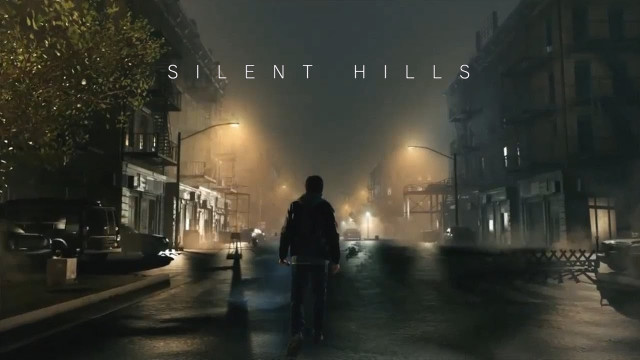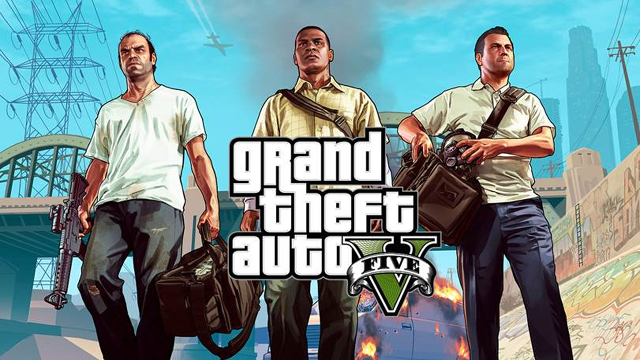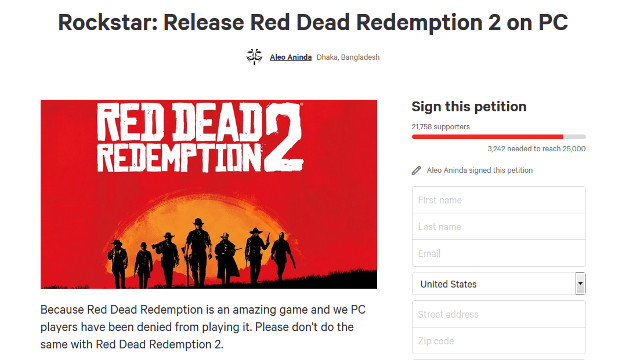More than 21,000 supporters in one day. That's an impressive figure for any Change.org petition, and this one in particular – a petition to bring the upcoming Red Dead Redemption 2 to PC, in addition to Xbox One and PS4 – has many people optimistic that it can actually have an effect.
But the history of these petitions, even when wildly popular, shows a different story.
While you could, of course point to thousands of video-game-related Change.org petitions that went nowhere and drummed up little support, like this man's attempt to make Activision release an All-Zombies Call of Duty game, that's not really the best metric to evaluate the efficacy of these petitions. The question is "when a petition starts to get what a reasonable person would consider a lot of support, do developers take notice and actually make the desired change?"
RELATED: Red Dead Redemption 2 and the Plight of the PC Gamer
The theory is easily arguable. A lot of people showing interest in something would be a queue to game developers and publishers that there is a viable market for that particular thing, making it a fiscally responsible change, as well as a consumer-friendly one.
Of course the counter to that is that developers and publishers will obviously have a different idea of what constitutes a "viable market." Is it 20,000, 40,000, 200,000? Since we're in the business of buying games – not selling them – we don't really know for sure. And that's assuming that every single person who signs a Change.org petition will then buy this new or altered product, which is far from a guarantee.
But enough theory; let's look at a few Change.org video game petitions.

When Hideo Kojima had his now-infamous falling out with Konami, the surprise, upcoming Silent Hills was the first thing to go. Despite its cancelation, Silent Hills still had enough support to spawn a Change.org petition, which gathered almost 200,000 signatures. That being said, Silent Hills has remained canceled with no indication that it will ever be resurrected in any capacity (besides, of course, the dozens of indie knock-offs).
But that game was canceled due to political reasons involving a controversy the extent of which no one will ever truly know, so perhaps it was beyond saving, even if it got millions of signatures on a petition.
RELATED: Del Toro: Silent Hills Isn't Gonna Happen
Another such petition was that regarding Metroid Prime: Federation Force, calling for its cancelation, which, of course, didn't happen and was never going to happen, especially not if only a paltry 24,000 effectively said they just won't buy the game. Oddly enough, though, the game got middling-at-best reviews and sold fewer than 4,000 copies upon release, being deemed a commercial failure, so maybe they should have listened to Change.org.
In all my research, I have only found two petitions that saw their goals come to fruition. The first one is the petition to remove from SimCity the always-online requirement. As history will show, EA eventually did remove this requirement – a year after the petition was spawned. So, while this was technically a success, you'd be hard-pressed to positively identify the Change.org petition as the reason. There was also so much vitriol surrounding SimCity's hilariously tumultuous release that I doubt a Change.org petition was necessary for them to make that change.
As a side note, this one in particular goes to show how front-loaded these signatures are. The petition reportedly received 34,000 signatures in one day. And in the year following, before the closure of the petition, it only managed to get up to 79,681 signatures, barely doubling its one-day total in the subsequent 364 days.

The other "successful" campaign – and this might give Red Dead Redemption 2 PC fans cause for even more naive optimism – was the petition to bring Grand Theft Auto V to PC. Its 700,000+ signatures made it one of the most, if not the most, supported video-game-related Change.org petitions. And, to the pleasure of the people who started the petition – Grand Theft Auto V was indeed released on PC.
That being said, it was always the intention to do so simultaneously with consoles, meaning it was likely part of Rockstar Games' plan the entire time when releasing the game on next-gen systems. And, as was the case with the SimCity petition, Rockstar made the change desired by the Change.org petition two years after the petition started, and they never officially responded to it.
In closing, even popular Change.org petitions often don't see their desired results, and, when they do, it's usually because of something else or was already part of the plan in the first place. So does the Red Dead Redemption 2 Change.org petition stand a chance at succeeding? The simple answer is "no." The more complicated answer is "while Red Dead Redemption 2 may very well come to PC some day for one reason or another, this Change.org petition likely won't be one of them."











